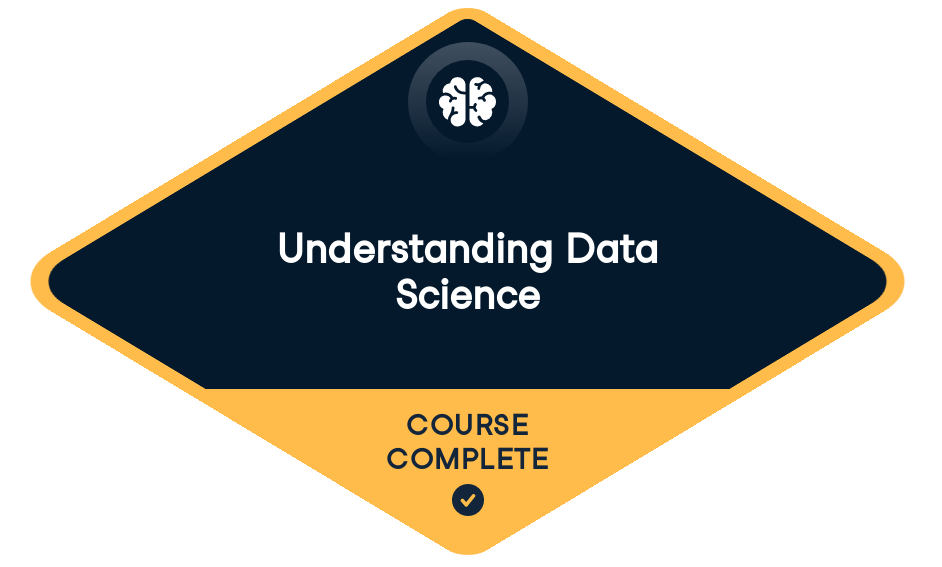
Loved by learners at thousands of companies
Course Description
What is data science, why is it so popular, and why did the Harvard Business Review hail it as the “sexiest job of the 21st century”? In this non-technical course, you’ll be introduced to everything you were ever too afraid to ask about this fast-growing and exciting field, without needing to write a single line of code. Through hands-on exercises, you’ll learn about the different data scientist roles, foundational topics like A/B testing, time series analysis, and machine learning, and how data scientists extract knowledge and insights from real-world data. So don’t be put off by the buzzwords. Start learning, gain skills in this hugely in-demand field, and discover why data science is for everyone!The videos contain live transcripts you can reveal by clicking "Show transcript" at the bottom left of the videos.The course glossary, promotional material and detailed learning objectives can be found on the right in the resources section.To obtain CPE credits you need to complete the course and reach a score of 70% on the qualified assessment. You can navigate to the assessment by clicking on the CPE credits callout on the right.
Training 2 or more people?
Get your team access to the full DataCamp platform, including all the features.- 1
Introduction to Data Science
FreeWe'll start the course by defining what data science is. We'll cover the data science workflow and how data science is applied to real-world problems. We'll finish the chapter by learning about different roles within the data science field.
- 2
Data Collection and Storage
Now that we understand the data science workflow, we'll dive deeper into the first step: data collection and storage. We'll learn about the different data sources you can draw from, what that data looks like, how to store the data once it's collected, and how a data pipeline can automate the process.
Data sources50 xpSorting data sources100 xpAsthma frequencies50 xpData types50 xpClassifying data types100 xpNet promoter score50 xpActivity tracker50 xpData storage and retrieval50 xpCloud platforms50 xpQuerying a database50 xpWhich type of database?100 xpData Pipelines50 xpData pipeline characteristics50 xpExtract Transform Load100 xp - 3
Preparation, Exploration, and Visualization
Data preparation is fundamental: data scientists spend 80% of their time cleaning and manipulating data, and only 20% of their time actually analyzing it. This chapter will show you how to diagnose problems in your data, deal with missing values and outliers. You will then learn about visualization, another essential tool to both explore your data and convey your findings.
- 4
Experimentation and Prediction
In this final chapter, we'll discuss experimentation and prediction! Beginning with experiments, we'll cover A/B testing, and move on to time series forecasting where we'll learn about predicting future events. Finally, we'll end with machine learning, looking at supervised learning, and clustering.
A/B Testing50 xpCreating an A/B testing workflow100 xpStatistical significance50 xpIntermediate results50 xpTime series forecasting50 xpClassifying time series data100 xpInterpret a time series plot50 xpSupervised machine learning50 xpWhen to use supervised learning100 xpFeatures and labels50 xpModel Evaluation50 xpClustering50 xpSupervised vs. unsupervised100 xpCluster size selection50 xpCongratulations!50 xp
Training 2 or more people?
Get your team access to the full DataCamp platform, including all the features.datasets
Course GlossaryCurriculum Manager at DataCamp
Hadrien has collaborated on 30+ courses ranging from machine learning to database administration through data engineering. He's currently enrolled in a Masters of Analytics at Georgia Tech.
Hadrien started using DataCamp when the platform only had 27 courses. He then joined the Support team and helped students before becoming a Content Developer himself.
Follow Hadrien on LinkedIn
Hadrien started using DataCamp when the platform only had 27 courses. He then joined the Support team and helped students before becoming a Content Developer himself.
Follow Hadrien on LinkedIn
Data Scientist at DataCamp
Sara is a graduate of a master's degree in Business Engineering and Marketing Analysis. Prior to working at DataCamp she worked as a Data Science consultant for a Belgian IT company. Sara is passionate about education, data science, and business and loves that she is able to combine all of these disciplines in her job at DataCamp.
Senior Program Manager, Duolingo
Lis holds a Master's degree in Computer Science from McGill University with a focus on computer science education research and applied machine learning. She's passionate about teaching all things related to data and improving the accessibility of these topics.
Join over 18 million learners and start Understanding Data Science today!
Create Your Free Account
or
By continuing, you accept our Terms of Use, our Privacy Policy and that your data is stored in the USA.